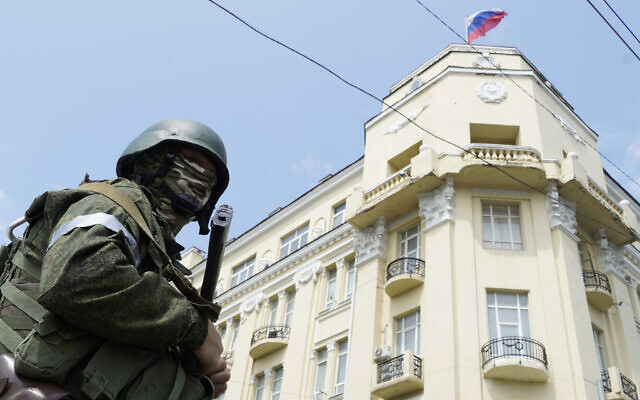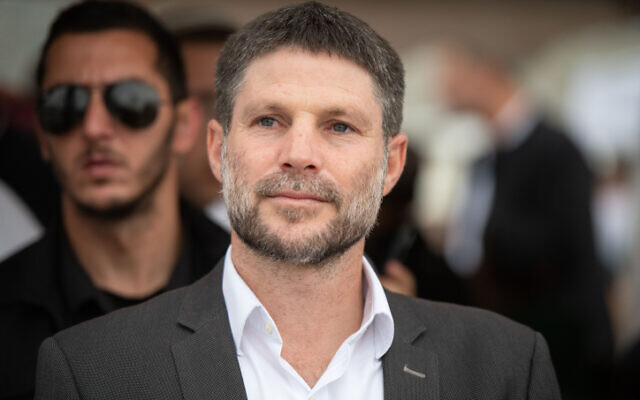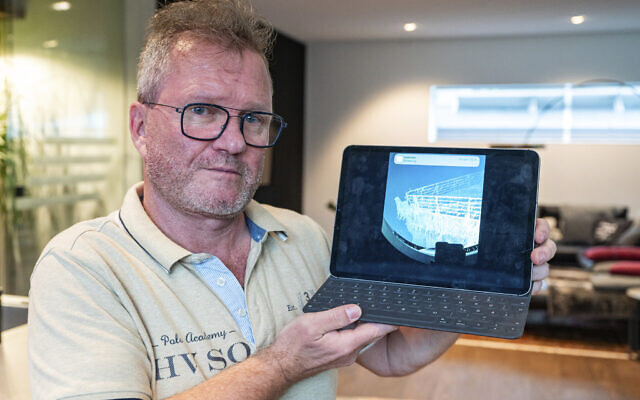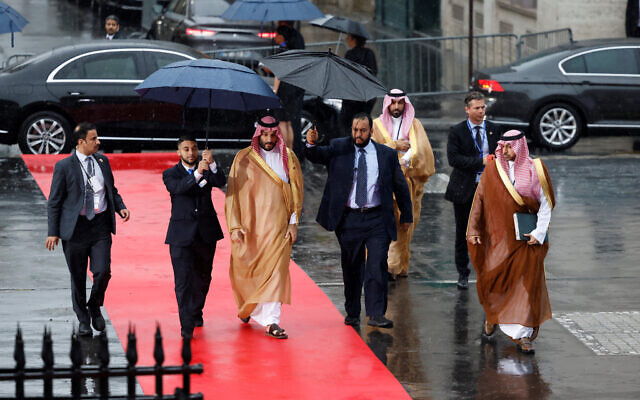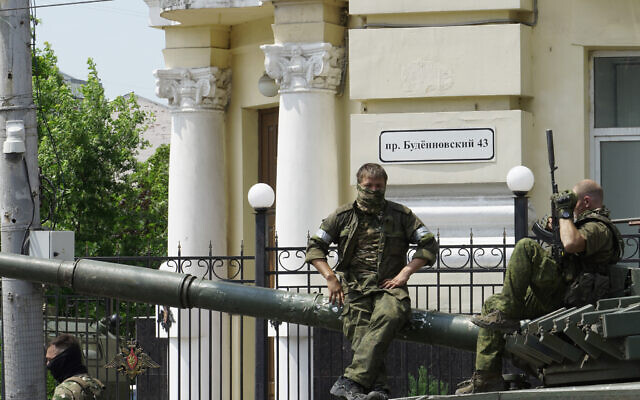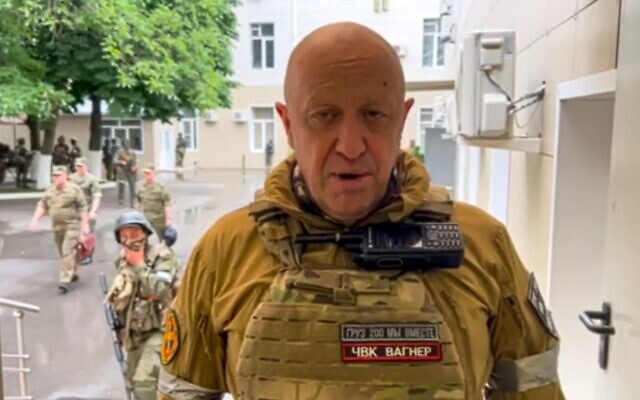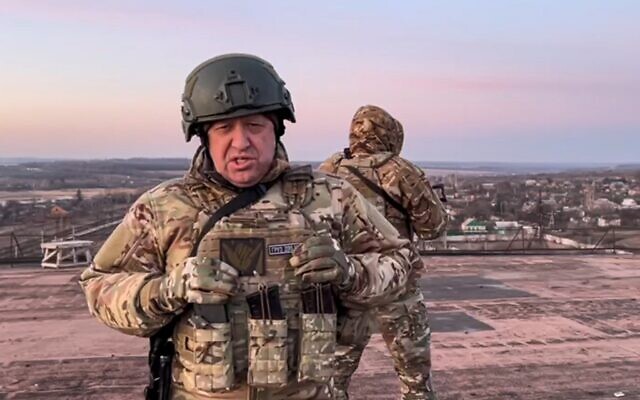What Matters Now to Brig. Gen. Yossi Kuperwasser: Breaking the terror wave
After a bloody week, a leading intelligence expert analyses recent IDF successes in the West Bank, offers points for improvement and tells us what keeps him up at night
Welcome to What Matters Now, a weekly podcast exploration into one key issue shaping Israel and the Jewish world — right now.
On March 22, 2022, four Israelis were murdered in a stabbing attack in Beersheba. In the same week, a terrorist shot and killed five civilians in Bnei Brak. Days later in Hadera, another terrorist attack occurred in which two Border Police officers were killed and 12 civilians were injured.
After this bloody week, the IDF initiated Operation Break the Wave, which the army defines as “a counterterrorism operation conducted to thwart future attacks and apprehend those involved in terrorist activities against Israeli civilians.”
It’s been 15 months since the operation’s launch and again this week Israel was rocked by a bloody week, including the killing of four more citizens in a terrorist shooting.
So we reached out to Brig. Gen. (res.) Yossi Kuperwasser. He is the former head of the research division in the IDF’s Military Intelligence division and former Director General of the Israel Ministry of Strategic Affairs.
Among his other current roles, Kuperwasser heads up The Institute for the Research of the Methodology of Intelligence, and he is a member of HaBithonistim and a new organization called The Misgav Institute for National Security & Zionist Strategy. And at the Jerusalem Center for Public Affairs (JCPA) think tank, he specializes in the security dimensions of the Israeli-Palestinian Conflict.
According to Kuperwasser, the current flare-up of Palestinian armed violence is not coincidental, but the fruit of a carefully cultivated extremism that surrounds Palestinians on all sides. And the region’s many terror groups are all too ready to embrace any volunteer.
“That’s why I’m totally against this idea of lone wolves. These are not lone wolves. These are wolves that were bred by the incitement that comes from all these places. And once you prepare them mentally to be a wolf, eventually they are going to carry out a terror attack,” said Kuperwasser on Wednesday.
In this week of yet another surge in terror, we ask security expert Yossi Kuperwasser, what matters now.
The following transcript has been lightly edited.
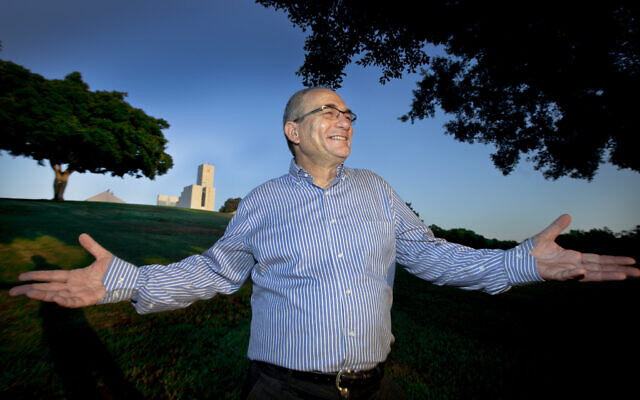
The Times of Israel: Yossi, thank you so much for joining me here in Jerusalem’s Nomi Studios.
Yossi Kuperwasser: Thank you for having me.
This week, in which we saw a terrible terror attack next to Eli, which left four dead, in which we saw increased pushback in fighting in Jenin. I ask you, Yossi, what matters now?
What matters now? Well, in the short term, it’s finding a way to handle the terrorism coming from the areas controlled by the Palestinians in Judea and Samaria. And the second thing, not less important — is to follow what’s going on in the regional architecture, the way it changes with the talks between the United States and Iran about the nuclear project, and the relations between Saudi Arabia and Israel, Saudi Arabia and Iran. A lot of things are happening in the regional structures, that change as we watch them.
It is impossible to disengage the macro from the micro in this region, in any case, but let’s start with the micro. And I’ve lived here since 1999, so I was here during the Second Intifada and during the Lone Wolf Intifada, and other things of this nature. But it feels to me that something has changed somewhere along the line. And I was speaking with our military correspondent Emmanuel Fabian earlier this morning and he mentioned the idea that the Gilboa Prison break of 2021 was a moment in time in which the Palestinians felt more emboldened, and now we’re reaping the fruits of this. Do you agree with that?
Well, I think the Gilboa break had some impact on the situation. Yes, it created a feeling on the Palestinian side that we can outsmart the Israelis in some things. But I think more than that, it was the series of terror attacks that took place beginning in March last year that ignited the terrain and all places, especially in the northern part of Judea and Samaria, the northern part of Samaria. And we are still going on with this battle against terrorism coming from there since last March, March 2022, and we haven’t yet found a solution.
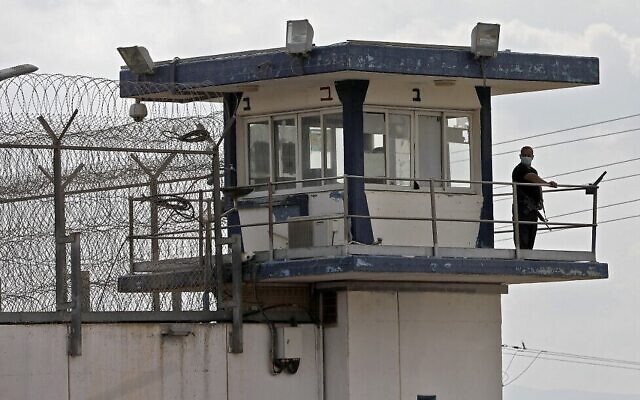
We managed to put pressure on them through the Operation Break the Wave which goes on day in, day out, or actually night in night out in the northern Samaria area.
But, this by itself is not enough in order to really bring an end, because the idea of this operation is that we operate according to information we have in order to prevent and foil terror attacks — extremely important. And we have good intelligence that enables us to reach the terrorists in their homes before they are going to carry out the attack — wonderful. And on top of that, it also allows us to have some friction with the surroundings of these terror groups that exchange fire with us. And most of the time we end up in a situation where we are not hurt, and those who shoot at us pay a price, which is good.
But at the same time, we have not taken the necessary steps in order to handle those groups that we don’t have intelligence about. And we have to realize we are not ever going to have the full intelligence picture about everybody and anybody who wants to carry out a terror attack. And so what happens is that, from time to time, these groups manage to carry out more terror attacks, and if we don’t apply some tools that would allow us to deal with those attacks that we don’t have intelligence about, this is going to go on.
That’s why I wrote and preach for more presence of IDF soldiers along the main roads, and even to put some roadblocks and checkpoints along these roads, which is not the case most of the time. So that if somebody goes out from the village of Urif, which was the case yesterday, and wants to carry out a terror attack in Eli, he has to go through a checkpoint and then in the worst case, there’s going to be some fire exchange with the soldiers and not with the civilians, sitting in a hummus restaurant and suffering, being totally exposed to terrorism without being able to defend themselves.
So that’s one thing. And I think that this move is also important from another aspect, because what we have done so far was to separate totally between our fight against the terrorists and our relationship with the population in the areas where they operate from. And we are trying to pinpointedly hit the terrorists, but we don’t do anything about the people that support them. And the economy of the areas where the terrorists are operating flourishes as if nothing happens. We make sure that everybody goes to work in Israel, or in the settlements, or wherever and they feel very safe. Nothing’s going to happen to them and even their economic conditions are not going to be affected, and living standard is not going to be affected by the fact that there is terrorism from within.
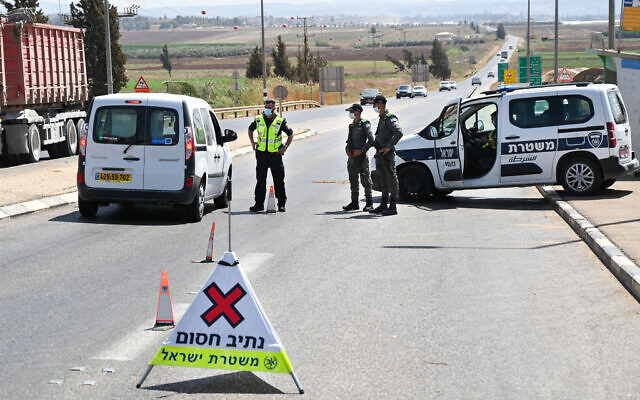
If we just put the roadblocks, we add two things: First of all, we will prevent some of the terror attacks that we should be able to stop on the way. And secondly, the population will start asking questions and say: “Well, we are paying a price.” We also have to stand in the roadblocks. So maybe we’ll speak with those terrorists and tell them: “Guys, enough is enough.”
Or, couldn’t they say: “Wow, we’re paying a price, let’s speak with the terrorists and join up in order to fight the people who are putting the roadblocks in.”
I don’t think so. Some of them will do that, some of them will do this, but most of them, I think, will call on the terrorists to stop it, because they are going to pay a price. And until now they don’t pay any price. By the way, you were here, you said from 1999. In 1999, I was the Chief Intelligence Officer of the Central Command, I was responsible for the situation. And I know what happened during the Second Intifada.
What brought the Second Intifada to an end was the understanding of the Palestinian leadership that they have to do something about it, because they are paying a heavy price. Not only the terrorists amongst them, but the entire society also was paying a price. Palestinian interests were paying a price. And that’s not the case today.
The Palestinian Authority is either totally uninvolved in what’s happening and just watching from afar, or encouraging the terror attacks by paying salaries to the terrorists and joining in with their incitement. And they have to be on the side of the terrorists and that’s how they feel, and they don’t do anything in order to stop it. I think that one of the reasons why they don’t do anything to stop it is that the vast majority of the Palestinian population doesn’t feel that they pay any price for what’s going on.
I think, for example, that on top of putting more roadblocks and checkpoints along the roads, we can also take steps in order to minimize the presence of Israelis in Palestinian cities. Because today much of the economic flourishing of the Palestinian economy is based on the presence of Israeli Arabs that come to have commercial activity in those cities. And this is dangerous. And this is something that we should at least suspend for a while.
Why is it dangerous to have economic cooperation between —
Because it’s dangerous for the people that enter the cities at a time like that, so we should suspend it for a while. And this by itself is also going to send a message to the Palestinians that there is a price for this terror wave. Until now, this is not the case. And you see it: After the operation in Eli, they spread sweets, have celebrations. They don’t pay any price for that.
I definitely don’t want to see the price paid out by hooligans from within the Jewish communities in the Samaria area that go into Huwara and do all kinds of stuff, and hit cars and things like that. This is terrible, and should be highly condemned and prevented, but the government should take steps that would send us the message that there is a price. Instead, we are busy all the time strengthening [Palestinian Authority President Mahmoud Abbas] Abu Mazen. Not only is this a waste of time, because it’s not going to be strengthened anyhow, but it creates a situation where nobody pays any price for the ongoing terror attack that they support, that they encourage and that they pay salaries to those who perpetrate it.
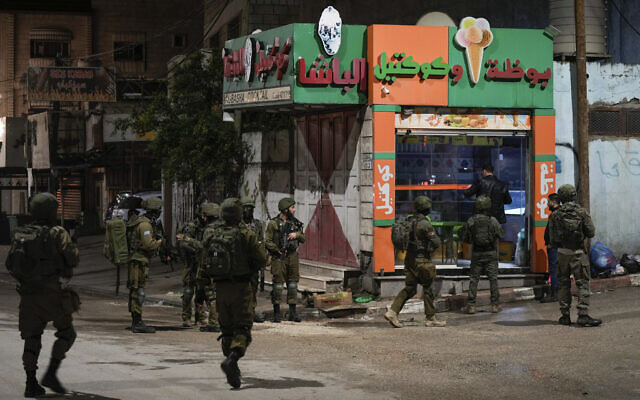
To the families, because those who perpetrate usually die.
No, some of them die, some of them end up in prison. And if you end up in prison, your situation is even better, because you really get a very high salary for life, from the Palestinian Authority, and we don’t take any real steps about it. The Americans are even worse than we are. They are very proud that they give more and more money to Palestinian Authority, even though they cannot give it directly. So they give it indirectly. They found all kinds of ways to bypass the Taylor Force Act that prevents them from giving money to the Palestinian Authority. So they give it to all kinds of organizations that the Palestinian Authority is supposed to support. And by that, they ease the pressure, the economic pressure on the Palestinian Authority and allows it to keep paying salaries to terrorists.
This is totally ridiculous. And on top of that, the American administration, in an unbelievable way, makes the comparison between the victims of terror and the terrorists that perpetrated the terror attacks.
Which was walked back eventually. But, let’s talk a little bit about what you said a few minutes ago about getting information about organizations that we don’t even know exist. And there’s one organization that jumped into the news in the past year, and that is the Lion’s Den. You don’t hear about it so much in the past month, but Lion’s Den all of a sudden popped up. Is that an organization that was even on the radar of intelligence?
Well, I don’t know because I’m not in intelligence anymore. But definitely, in my mind we were surprised. In my mind, Israeli intelligence was surprised again and again in the recent year or two. We were focused, in my mind, on Hamas and Palestinian Islamic Jihad, and maybe to a lesser extent on the Tanzim. And we were surprised again and again.
We were, first of all, surprised by the fact that some of the initial terror attacks back last year were perpetrated by people that were affiliated, not directly, but indirectly with the Islamic State, and not with any Palestinian terror group. And then we were surprised by the rise of the Lion’s Den and similar groups like the Jenin Battalion and all similar groups in each town, there was something like that. And I don’t think we were prepared, to the best of my understanding we were not.
It took us a while, we made the necessary adjustments, and today we are familiar with these groups. But the rise of these groups was an expression of something deeper, of the understanding of the Palestinians, that trying to move along the old lines of terror organizations that follow a certain process of developing terror attacks that we can spot on the way and foil, was the wrong way. And they should prefer to work differently in a way that makes it more difficult for Israel to find in advance that some terror attack is in the making. And this is something that can be done not from within the organizations, the known organizations, but from different groups that are not the old-style organizations. That’s what we’ve seen.
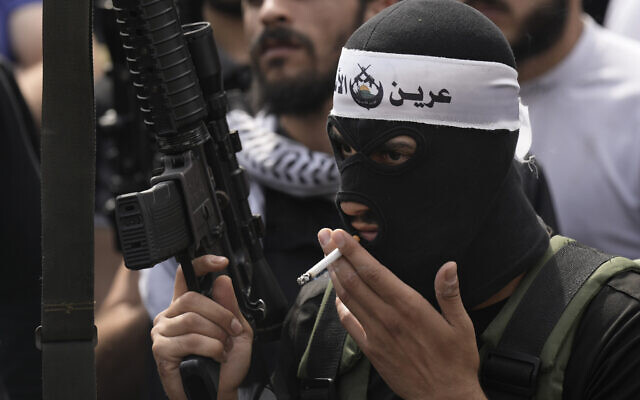
That the net is being cast broader, and these grassroots little groups are getting together and perpetrating attacks, even as individuals — we’ve had that in the past too. And that they expect a payout at the end? Is that part of the calculus in perpetrating the small group attacks?
They do get support from all the organizations, they get support from the Tanzim of Fatah — Abu Mazen’s group, they support them. They do get support from Hamas, they do get support from Palestinian Islamic Jihad and from time to time they even take responsibility or some sort of responsibility.
Like this week we had Hamas-affiliated but maybe not members?
They did everything to take responsibility, without taking responsibility.
Exactly. So what is this about?
They want to distance themselves and at the same time let everybody know that they are involved, that’s the idea. But in some cases, they actually did take even direct responsibility. For example, for the explosive charge that hit the armored car in Jenin. The Palestinian Islamic Jihad said: “It’s our engineers that were responsible for that.” So when something succeeds, from their point of view, they take responsibility, and in many cases not full responsibility.
But there’s an ongoing cooperation between the organized terror groups, and less organized terror groups that appear on the ground. And they are supported by the ongoing incitement that comes from all sources. From Hamas, from Palestinian Islamic Jihad, from Palestinian Authority, from Fatah, from the media. Everything promotes this incitement and hate indoctrination.
That’s why I’m totally against this idea of “lone wolves.” These are not lone wolves. These are wolves that were bred by the incitement that comes from all these places. And once you prepare them mentally to be a wolf, eventually they are going to carry out a terror attack and you don’t have the mind behind it worrying if this is going to be Muhammad from Jenin or Ahmad from the village of Urif. This is the way it works, and we see it again and again.
You don’t see it in any other society. What other society develops people that are going to kill innocent people, and they feel that they are doing the right thing? They’re proud of what they’re doing. It’s totally crazy.
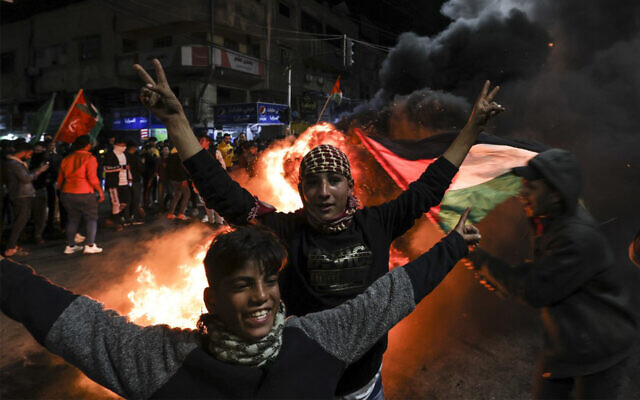
I want to walk you back to the mindset of somebody who has been raised on their mother’s milk, on the Torah, on the scripture, of harming Jews in order to reach this payout. Is the idea to sacrifice yourself for your family, or in order to make your family secure with this Pay-to-Slay money, or what is the mindset here?
The mindset is much wider. Palestinians have a narrative. The incitement is the effort to instill this narrative in the minds of any Palestinian, from day one and to keep him committed to this narrative all along his life.
And this narrative says, first of all, Jews are not a people. That’s why they do not deserve a state, they are just a religion.
Secondly, Jews never had a sovereign history in this piece of land. That’s why they were fighting in the 1920s against the idea that the British Mandate was to reconstitute the Jewish national home in Palestine. They said there was never such a sovereign state, which is nonsense, of course, but of course, there was a Jewish state in so-called Palestine, in Eretz Yisrael [the Land of Israel].
And the third element in this narrative is that the Jews are terrible creatures. It’s a very antisemitic narrative. The Jews are terrible creatures. Nobody wanted them to live next to them, so they sent them away from Europe. The Europeans couldn’t stand them. They sent them away and they sent them to this place because they thought that this was going to help them keep the Muslims away from Europe. They are terrible creatures, according to all the lines of the antisemitic European versions of the Protocols of the Elders of Zion and so on, so forth. And on top of that, there is the addition of the Muslim antisemitic approach to Judaism, that the Jews are the descendants of apes and pigs and all of that. And because of that, there is no justification for the Jews to live next to us. Why are we to suffer? Nobody wants to live next to the Jews. Why should we Palestinians live next to the Jews? And because the Jews are such terrible creatures, it is allowed to kill them.
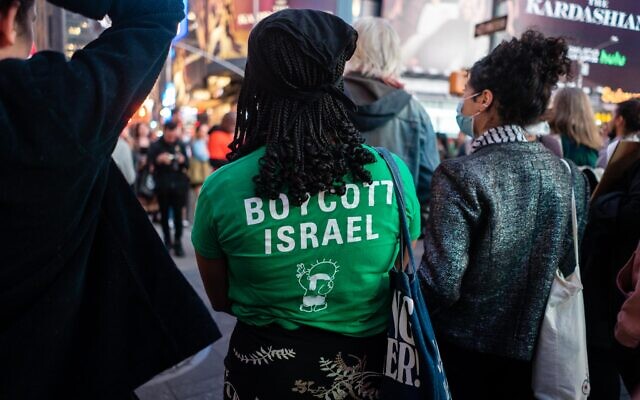
And the fourth element in this narrative is that, if you want to be a good Palestinian, you have and you want to contribute to the struggle against Zionism that wants to bring the Jews to this place, you have to be struggling against it. You have to contribute to the struggle. And there are all kinds of ways in which you can contribute to the struggle. You can write poems, you can stick to your land, you can promote BDS, fight against the legitimacy of Israel abroad, you can use lower levels of violence and you can use higher levels of violence. All of them are parts of the struggle against Zionism. And everybody who participates in the struggle against Zionism should be appreciated and rewarded.
And the fifth element is that our struggle is not only national, it’s also religious. We are fighting for Islam and for the Palestinian Arab people. And there’s no way to separate the two. They’re totally intertwined. That’s why you always see that those who carry out the attacks they speak about, they turn into shahids and martyrs, religious martyrs, and they always speak on behalf of Allah. And they do that for Islam, not only for Palestinian nationalism.
And the sixth element, which is also very important, is that we, the Palestinians, are the only victims of this conflict. And the logic of victimhood, of course, justifies the ongoing terrorism.
And finally, the final element in this seven-point narrative is that we should never accept Israel as a Jewish state because of all of the above. We should never accept Israel as a Jewish state. That’s why the conflict perpetuates because they are not ready to accept Israel as a nation-state of the Jewish people, democratic and with full rights to its Arab citizens. It doesn’t matter. As long as it’s defined as a Jewish state, they are not ready to accept it like that.
And that’s why they make it clear that they fight for Palestine to be free, as they say, from the river to the sea. The existence of Israel is something that is not acceptable, Israel as a nation-state of Jewish people. Some of them can see, even some of Hamas can see, a certain interim stage in which there is something called “Israel,” which is not the nation-state of the Jewish people, but the nation-state, the state of all its citizens. That can be some sort of an interim stage, but it’s a stage on the way of liberating all of Palestine.
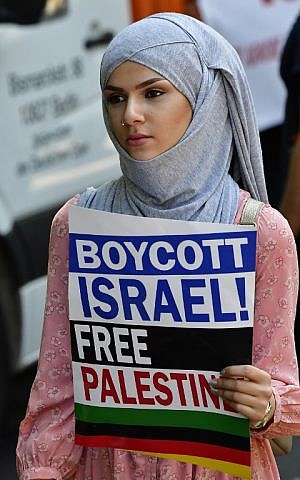
How many people do you think adopt all of these seven points?
All of them.
All of them.
All of them.
But so few actually take to violence.
As I said, you can struggle in many, many ways, you can struggle politically. Abu Mazen would rather have a combination of struggle that is mainly political and some violence. And most of the time he would advise using violence only in what he calls “popular resistance” or “peaceful popular resistance,” which means the use of non-explosive arms, knives, stones, maybe sometimes car ramming. And that’s not always, but sometimes it’s also allowed.
That’s what Abu Mazen most of the time thinks, that it’s the best way to gain progress towards reaching the Palestinian goals, because he thinks that this will minimize the international criticism and will create the conditions to put pressure on Israel. But he also says, “But if Hamas decides to launch rockets, and Palestine Islamic Jihad wants to use explosive charges, that’s also fine, that’s also legitimate.” That’s why he pays the terrorists from all organizations, regardless of what they’re doing. He would pay Hamas terrorists just as he pays Fatah terrorists, and he makes no differentiations when it comes to paying, because he respects them all. He prefers, he thinks, he advises them, to stick to this popular resistance, unlike what he would think of as armed resistance.
But it seems as though the armed resistance is on an upswing in the past several months, for sure the past year. Why is that?
Why is that? Because you can’t control it, once you go on with this incitement and you justify the armed resistance. For many youngsters who didn’t live in the time of the Second Intifada and didn’t know and don’t know what the prices are that are being paid, and get the impression that there is no price being paid. For them, their own sacrifices are not a price, they’re a ticket to paradise. They’re ready to pay the personal price, and the families are not only not charged the price — they are respected and have a lot of esteem from their society. So there’s no problem, from their point of view, to take the risk of losing their own lives or being arrested or whatever. That’s something that they are ready to pay.
Let’s talk about what happened in Jenin this week, in which forces went in and were surprised, it appears, by the vehemence of the opposition.
I don’t think they were surprised by the vehemence of the opposition. We enter Jenin on a weekly basis at least, and whenever we enter, forces enter Jenin. They are attacked vehemently by many people with guns, and I think this is well-known. The new element was in this last operation was the explosive charge that hit the car. If there was no explosive charge, the car would have gone out and nobody would hear about it.
And the use of the helicopter?
The use of the helicopter was in reaction to the explosion against the car, because there was a need to protect the soldiers while they were evacuated. We had seven people wounded, so there was a need to bring the helicopter to make sure that you can reach the car and evacuate the wounded people.
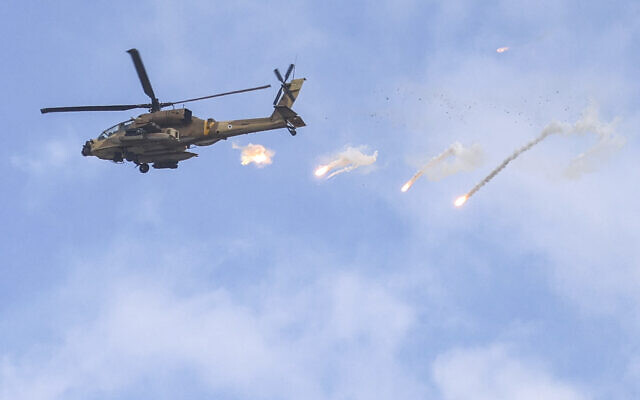
Do you see the future of airstrikes in the West Bank after this use of helicopters successfully?
We may reach that point. It’s not in the immediate future, but we may reach that point. We prefer to operate with ground forces, although if the situation is going to deteriorate and we are going to pay prices for that, we may use helicopters or other tools that can do the same work from the air.
The difference is that you cannot hold arrests with a helicopter, or any kind of air vehicle. If you want to arrest, and that’s what we want to do, we want to arrest. We don’t come in order to kill anybody. We come to arrest people that we know are in the midst of preparing a terror attack. We prefer to arrest them than to kill them because this enables us to have more information and more intelligence that we need, and because as long as we can arrest them and not kill them, it’s also, from a moral point of view, it’s a better option.
But I believe something like 130 Palestinians have been killed during these operations this year.
Yes, true. That’s true, because they either refused to be arrested and started shooting at the forces, so we had to shoot back. Or while we were performing the arrest, a lot of people from around the place where the arrest was taking place started shooting at the forces and we shot back. And, some of the 130 were killed while they were actually carrying out terror attacks. That happens quite often as well.
Out of the 130, I don’t have the exact count, but I would say that about 120 were terrorists, either directly involved in terrorism or shooting at our forces, which forced us to shoot back. And about 10 were people that were unfortunately in the line of fire and like, for example, Shireen Abu Akleh and this toddler, recently in Jenin. This happens from time to time. It’s terrible, but generally speaking, I would say that with the extent, the magnitude of the operations we carry out every night, we enter several places, highly dense areas, and carry out an arrest in such an environment and ending up with only very few uninvolved people that are hit by our soldiers, we can be satisfied, in general. Of course, any specific case should be checked and we need to see what happened specifically.
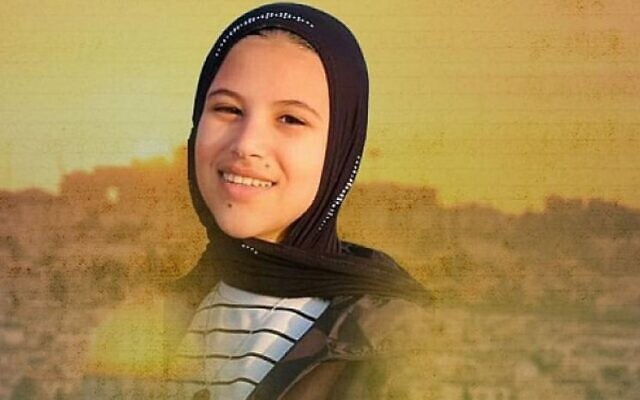
So the Break the Waves operation has been going on for how long now?
Fifteen months, something.
In your estimation, is it a successful operation or should we be reevaluating at this point?
First of all, it is a successful operation because many, many terror attacks were foiled and we prevented many terror attacks and we were able to arrest many people that were involved in terror attacks after they carried out the terror attacks. I think we don’t have, today, anybody that carried out the terror attack that we haven’t arrested already. So from that point of view, this was a very successful operation.
That said, of course, we have to reevaluate all the time and see if this is enough. It has a very wonderful contribution to our security, but not enough. The fact is that more terror attacks come up. And that’s why I’m saying we have to strengthen our presence in the territories, put more roadblocks and checkpoints, and maybe even, from time to time, create more friction operations. If you can’t have the information by intelligence, sometimes you just enter the Jenin refugee camp. It’s not something that we are doing, I suggest it for the future. If we find that we don’t have enough information, you enter the refugee camp and you create a situation where those who are about to carry out terror attacks are going to shoot at you. And then you can either arrest them or hit them because you are not going to have enough information anyhow. We are not going to ever have enough information.
Let’s talk about foiled terror attacks. Now, you are involved in intelligence. You gather intelligence and then you present it to whom? And then they say, okay, now let’s go and catch these guys before they actually do anything. How does that work out?
Well, today it’s working out on the lower level because there was a green light to carry out arrests, wherever necessary.
This operation that’s going on?
This operation, so if you have information, you show it to the regional commander. He will probably approve it, depending on the availability of forces and things like that. Of course, if he knows that two guys are planning to carry out an attack and they are sitting in a certain house in Nablus or in Jenin, and if you don’t hurry up, they are going to carry out the attack, he would approve it. And this is the kind of information we have today.
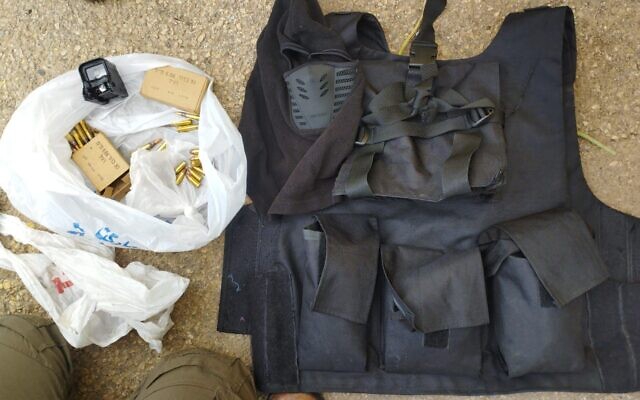
Define attack, though, what could it be? A knifing or stoning or what kind of level?
The operations we are carrying out are not against knifing and stoning. Knifing, we can have an operation in retrospect. After there is a knifing attack, we may try and have an operation to find the guy who carried it out. But most of the terror attacks that are planned and foiled in this process are terror attacks with firearms.
Look, we had one successful prevention attack against a group, a cell of the Palestinian Islamic Jihad that was developing rockets that was planned from Gaza. If you remember, one of the guys that was killed in Gaza was in charge of that effort. So these are the things that we are most focused upon when we enter. As I said in some other interview, we don’t enter Jenin refugee camp or Nablus because we have nothing to do in the afternoon or overnight. We do that because we have to prevent, we fight against real attempts to kill Israelis. And that’s a wider effort that we have to fight against.
One major element of this fight is this ongoing attempt to foil the terror attacks before they go out by entering these places. A second effort should be a defensive effort, more presence, and a third effort should be on putting pressure on the Palestinian Authority and on the Palestinian population to help us put an end to this terror campaign. And the fourth effort should be done on the level of incitement. Because if you don’t deal with the incitement, whatever we do is going to be short-term.
So let’s talk about the Palestinian Authority. Abu Mazen is almost 90, if I’m not mistaken.
88, or 87.
Okay. And I’m not an ageist. I’m sure he’s doing just fine.
His father died when he was 102.
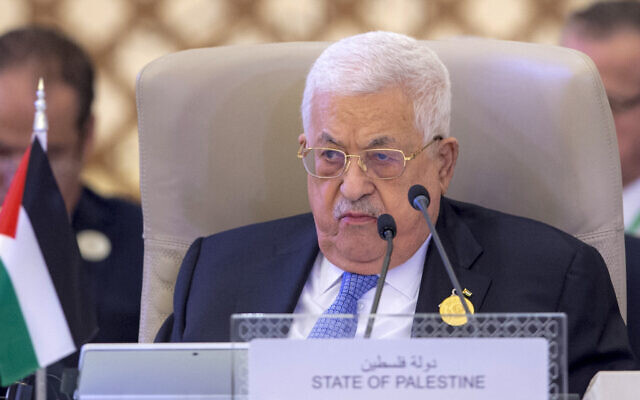
Wow, that is perspective. But on the other hand, I’m sure Israel is preparing for a post-Abu Mazen world. And what are we thinking so far?
Well, frankly, nobody, including Abu Mazen in my mind, doesn’t know what’s going to happen after Abu Mazen. We got so used to Abu Mazen. First of all, his impact on the situation even today is becoming less and less, so we can see that’s what’s happening.
Secondly, he has no clear successor. He’s grooming Hussein al-Sheikh and Majed Faraj, the head of security, to be his successors. But then they don’t have the little charisma that Abu Mazen has. They don’t even have that. And they are challenged by many people from within Fatah, by Muhammad Dahlan, by Mahwan Baghrouti, by Jibril Rajoub, by [Mahmoud] Aloul. Everybody has a little more charisma than they have, but it doesn’t really matter. All of them are committed to the same narrative that I mentioned before. So whoever is going to succeed Abu Mazen from within the Fatah is going to have the same narrative.
But do you see that his successor will come from within Fatah and not with Hamas, for instance?
I think it’s going to be, first of all, an effort by Fatah to succeed him, and they will have to decide how they are going to do it. They might choose somebody like Hussein Al-Sheikh or somebody like that to succeed him in most of his responsibilities. They might decide to have a joint leadership, understanding that the alternative is an internal struggle that nobody wants.
They might fall apart, that’s also a possibility. They might just fall apart. And everybody is going to have a fiefdom for himself where he has the most power. And the Balata refugee camp is not going to be cooperating with the Aska refugee camp or with the Nablus town. And that may well be the case. There’s a clear possibility of chaos.
And what do you think is in Israel’s interest at this point?
Israel’s interest would be that this would be an opportunity for the Palestinians to do some soul-searching and decide that this narrative led them nowhere. But the chance that this is going to happen is not that bright.
So I think, at the end of the day, Israel’s interest would be that the Palestinian Authority will remain as a tool and that in the longer run, the content in this tool will be changed in a positive direction. That’s the best thing we can reasonably hope for right now.
This is not necessarily going to be the case because the battle between the narratives is going to be about who is more committed to the struggle against Israel, not who is more committed to cooperating with Israel. Unfortunately, that’s what I see more likely to happen.
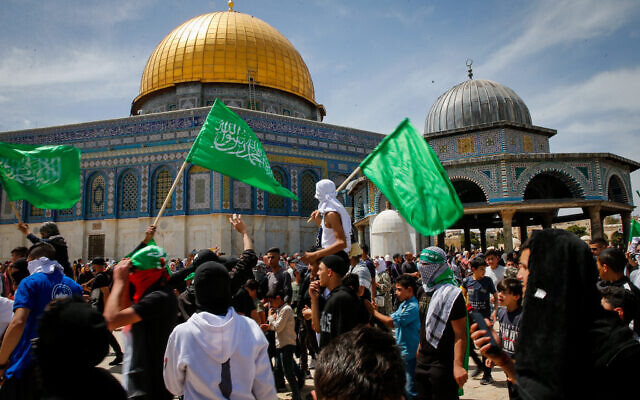
And of course, there’s also the worst possibility, which is Hamas taking over. I think we are going to take steps in order to prevent Hamas from taking over. But if there is chaos, God knows, and you see that Hamas, everybody is preparing for the day after. But inside Fatah, everybody is preparing separately. There’s no organized joint effort of Fatah to prepare for the day after. Hamas does it in a more concentrated manner, so they are going to be maybe more or better prepared when the day comes.
Where does Islamic Jihad fit into this?
Islamic Jihad doesn’t have aspirations to become the leader. They will probably cooperate with Hamas if there is a need. But you don’t think of themselves as contenders for leadership.
But in the past several months, it seems like that’s the organization that everyone has their eyes on, no?
Yeah, because they’re the most active, because they don’t abide by any other considerations. Fatah has to think about what’s going to happen with the population. So does Hamas when it comes to the population in Gaza. But the Islamic Jihad doesn’t have to worry about what’s going to happen to the population. So that gives them a lot of room to maneuver, and they use it until they get knocked on the head. They keep doing that.
Let’s zoom out a little bit and now talk about how Iran fits into all of this.
Well, Iran stands behind much of it. They finance much of the activities of Palestinian Islamic Jihad and of Hamas. They support it with technology that’s needed for improving their weapons and they finance the efforts through Hezbollah that end up promoting the capabilities of the terrorists in the Judea and Samaria area. So they are very much involved in that. They see that as a part of their wider effort to wipe Israel off the map. And they are committed to that. And we see their efforts to strengthen Hezbollah and to strengthen their own presence in Syria — to turn it into a base from which they can operate against Israel. And this is, when it comes to Israel, the Iranian effort.
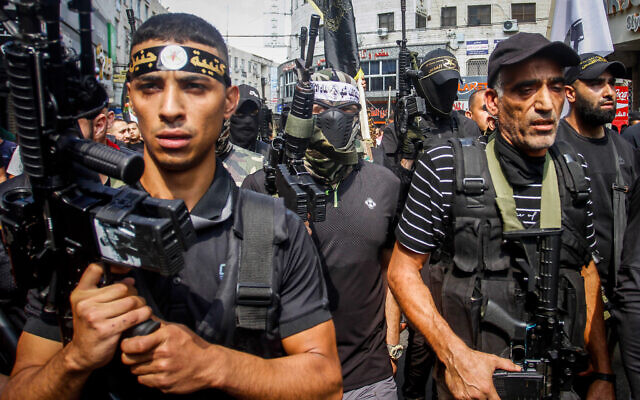
But it sounds like it’s all military, it’s all weaponry and things like that. And they’re not interested in involving themselves in the political arms as well?
Yes, but to a lesser extent, they keep some sort of reasonable relations, also with the Fatah and they might get involved in that as well. But this is not their bread and butter. They are much more connected to Palestinian Islamic Jihad and to Hamas leadership. And actually, as we speak, the leaders of Hamas and Palestinian Islamic Jihad are having meetings in Tehran.
From time to time, somebody from the Fatah is also in touch with the Iranians and conveys its appreciation to their contribution to the struggle against Israel. But the relations used to be even tighter in the past. They are not as tight today. They are reasonable between Fatah and Iran. I don’t think they are as tight as to enable Iran to intervene in inner Fatah politics — we are not yet there. It might happen in the future, but not until now.
Let’s zoom out even further and talk about the Iran-Saudi constellation that’s happening right now.
Well, I think this is really an important development because the general order, the structure of the Middle East, the architecture of the Middle East is changing, because the Middle East has been divided between the pragmatists and the radicals in the last 20 years or so. As a matter of fact, ever since the Iranian regime came to power in 1979 — there was a battle between the pragmatists and the radicals.
And the radicals were made of three groups: the Shiite radicals led by Iran, the Sunni, sophisticated radicals led by the Muslim Brotherhood, including Turkey and Qatar and Hamas. And Hamas is a special case because it belongs both to the sophisticated radicals, Sunni radicals, and to the Shiite group as well because it has very close relations with Iran.
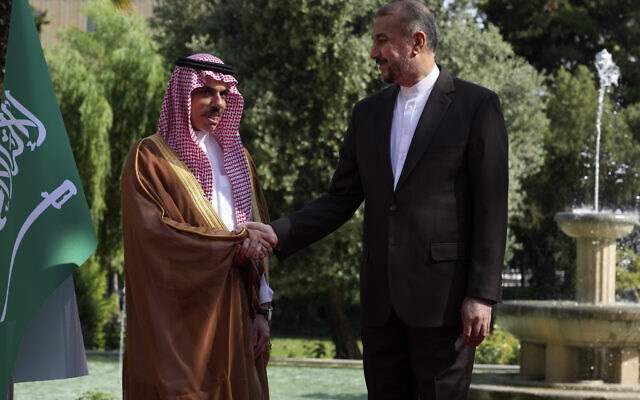
And there was the camp of the extreme radicals, extreme Sunni radicals, ISIS and Al Qaeda and all these guys. This was the situation in the Middle East. There was a struggle between the pragmatists and those groups.
What happens now is that because at that time the pragmatists believed that they would be able to rely on the United States as their supporter, to supply them with the security they need in order to flourish.
Recently the pragmatists came to the conclusion that they cannot rely anymore on the United States and the West. And it started with the JCPOA back in 2015 when they felt that they were thrown under the bus and together with us [Israel], and went on, but with some interruption during the days of Trump. With Biden’s administration, they again got the feeling that they are not treated well, and they are threatened.
And the attack in 2019 was a major turning point as well, the Iranian attack on the oil facilities in Saudi Arabia in 2019. So what happened was that Saudi Arabia under MBS came to the conclusion, or actually the pragmatists came to two conclusions. One was: “We cannot rely only on the United States, let’s be friends with Israel.” That brought the Abraham Accords.
And the other decision later on, when Biden came was that: “We cannot rely on the United States, let’s be friends with Iran and let’s be friends with China. That doesn’t tell us every morning that we should be more democratic and more respectful of human rights and all these kinds of things that do not fit us. We don’t feel comfortable with that.”
And this change led eventually to this agreement between Saudi Arabia and Iran and the tension between the pragmatists and the radicals has eased dramatically. It’s not that they don’t still have opposite points of view and world perspectives, they still have them, but they understand that they can cooperate. And from the Iranian point of view, it’s very good because it eases the tensions on them and they can move on. And the United States — seeing that development, being very preoccupied with what’s going on with China and what’s going on with Ukraine and Russia — the most important thing for them is just not to end up in an armed confrontation with anybody, including Iran. And that’s why they are moving towards some sort of understanding with the Iranians that would enable the Iranians to have a big stockpile of 60% enriched uranium, that is actually, they are a threshold nuclear state and the Americans are going to acquiesce with that, which is like — what?!
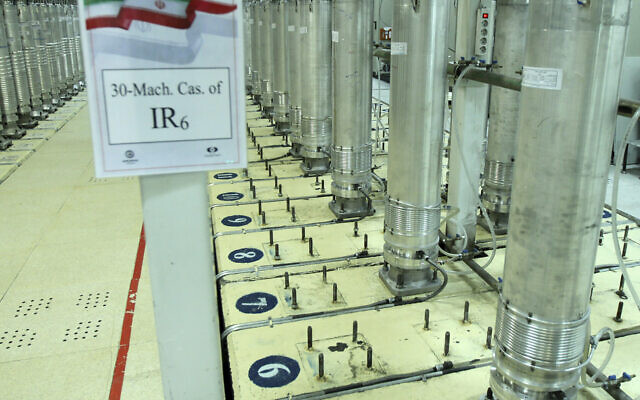
But this is what’s going to happen. Or at least it’s something that the Americans do not take off the table immediately and say: “No, never.” They actually say: “Yes, we are ready to,” and the problem is whether the Iranians are going to be ready to do that or not. Because from the Iranian point of view, it means that they have to make some commitments that they don’t really need. Now, they export a lot of oil anyhow, they don’t have a shortage of funds to the extent that would force them to give up on reaching uranium beyond 60%. If they’re going to do it, it’s only because the Israeli threat is still there.
Yossi, our time is drawing to a close. You’ve been in this business for a very long time, and so I wonder what specifically keeps you up at night right now?
What worries me most is, that we should find a way to explain to our friends and allies in the United States especially, but in the entire Western world, that this is something that is not less important than what’s happening in Ukraine. I’m not saying that what’s happening in Ukraine is not important. It is, but it’s not less important because there is one big difference.
The situation in Ukraine is a national dispute. Russians are unhappy. They made a terrible move, and they behave in a very problematic way. But they don’t try anymore to convince everybody to become Communist. The idealism that stands behind it is very limited, it’s about interest.
Iran is motivated by a missionary ideology. They want to turn everybody into a Shiite Muslim. That’s what they want to do. And if we allow a group of messianic people like that to have nuclear weapons, this is going to be extremely dangerous, and everybody should be aware of that and should take the necessary steps in order to prevent that from happening.
I’m happy that the Americans are saying that we should not allow Iran to have nuclear weapons. But I look at what they’re doing and I say to myself that there’s some sort of contradiction here between what they’re saying and what they’re doing, and this keeps me awake at night.
Yossi, thank you so much.
Thank you, Amanda. Thank you very much.
What Matters Now podcasts are available for download on iTunes, TuneIn, Pocket Casts, Stitcher, PlayerFM or wherever you get your podcasts.
Check out last week’s What Matters Now episode:
There's no paywall on The Times of Israel, but the journalism we do is costly. As an independent news organization, we are in no way influenced by political or business interests. We rely on readers like you to support our fact-based coverage of Israel and the Jewish world. If you appreciate the integrity of this type of journalism, please join the ToI Community.

We’re really pleased that you’ve read X Times of Israel articles in the past month.
That’s why we started the Times of Israel eleven years ago - to provide discerning readers like you with must-read coverage of Israel and the Jewish world.
So now we have a request. Unlike other news outlets, we haven’t put up a paywall. But as the journalism we do is costly, we invite readers for whom The Times of Israel has become important to help support our work by joining The Times of Israel Community.
For as little as $6 a month you can help support our quality journalism while enjoying The Times of Israel AD-FREE, as well as accessing exclusive content available only to Times of Israel Community members.
Thank you,
David Horovitz, Founding Editor of The Times of Israel

